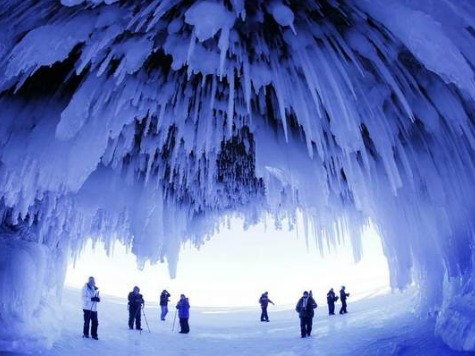Last week, the Great Lakes reached its broadest ice coverage in 20 years at 88% with Lake Superior measuring in at a staggering 95%.
The frozen Lake Superior, near Cornucopia, Wisconsin, has provided a rare icy walkway for about 35,000 people, as they hiked to reach dramatic ice caves accessible on foot for the first time in five years. The caves are sculptured out of sandstone by the lake’s waves and are reachable in warm weather by boat. However, due to the severe freezing weather that has ensconced the heartland of the United States, the caves are now accessible by walking across the ice.
George Leshkevich, a researcher for the Great Lakes Environmental Research Laboratory explained that a cool autumn and early winter combined with polar vortexes helped ice amass weeks earlier than normal. Consequently, sightseers came in throngs, to view the awesome frozen rock formation along the Apostle Islands National Lakeshore of Lake Superior, which is the world’s largest freshwater lake.
The freezing conditions also make employees at Maggie’s restaurant in Bayfield happy. The restaurant office manager Heidi Nelson, said “Our waiters and bartenders are just elated.” Maggie’s is doing more than double the business it normally does in February. February is generally a good month for Maggie’s because it caters to cross-country ski races. But this one is exceptional.
At the Bayfield Inn, manager Tyler Stoklasa exclaimed that this winter may be the busiest he’s ever seen. “We are doing July-type business right now,” Stoklasa said.

COMMENTS
Please let us know if you're having issues with commenting.